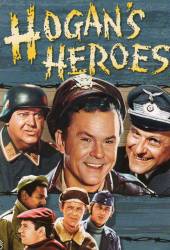German Bridge Is Falling Down - S1-E7
Character mistake: When counting the prisoners right at the beginning of the episode, Schultz counts to 15. However, including Hogan there are 19 men in formation.
Reservations Are Required - S1-E15
Character mistake: In this episode, Hogan suggests a helicopter as means for escape from Stalag 13. As a matter of fact, the allies had no helicopters operational before April 1944. The famous R-4 made its first flight only in January 1942. So unless Hogan planned to steal one of the Luftwaffe's 20 FW Drache (a maximum of ten or so existing at any given time) or a whole bunch of the single-seat Flettner Kolibri (24 total built) he was out of luck.
Anchors Aweigh, Men of Stalag 13 - S1-E16
Character mistake: Klink claims that the North Sea is about sixty miles from Stalag 13, in reality however the town of Hammelburg and thus the nearby camp are about three-hundred miles from the North Sea.
Happy Birthday, Adolf - S1-E17
Character mistake: The artillery officer asks "Does headquarters expect a squad of infantry to replace experienced artillery men?" Hogan only offered "his detachment", and he's wearing a Luftwaffe uniform (and so is LeBeau). Why does the artillery officer get the idea that the "detachment" would be infantry, that is to say, ground forces (Heer) troops? To avoid confusion: Yes, the Luftwaffe did have infantry units, but those would be viewed by other branches as Luftwaffe guards primarily, not as infantry.
The 43rd, a Moving Story - S1-E23
Character mistake: When Klink explains the route of the trucks carrying the red cross packages to Kühn, he for once uses a map actually showing Germany. Unfortunately, the places he points to start near Luxemburg and track all across Germany. The spot he places Hammelburg at would be near Poznan in Poland.
Request Permission to Escape - S1-E32
Character mistake: When ordering Schultz to finish cleaning his car, Klink salutes Schultz, his returning the salute with the garden hose in his hand leads to Klink being soaked. A salute is, except in rare circumstances, always initiated by the lower-ranking individual and returned by his superior, not the other way round. This rule is broken especially by Klink in several other places as well.






Answer: It's a solitary cell. Steve McQueen, star of 'The Great Escape' is known as the 'Cooler King'.